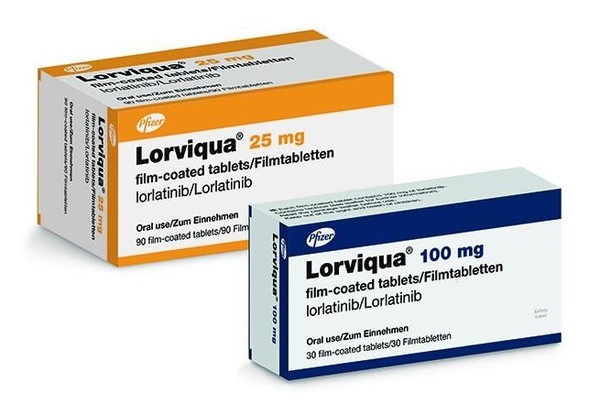Pfizer’s Lorviqua (ingredient: lorlatinib), a third-generation anaplastic lymphoma kinase (ALK) tyrosine kinase inhibitor (TKI), is expected to demonstrate less improvement in progression-free survival (PFS) in Asian patients, showing differences from existing ALK-TKIs.
Pfizer is scheduled to release the outcome of the Asian sub-group analysis of the phase 3 CROWN trial of Lorviqua at the congress of the European Society for Medical Oncology (ESMO 2021) on Tuesday.

The CROWN study is an open-label, randomized, phase 3 trial that directly compared Lorviqua with crizotinib (brand name: Xalkori) as the first-line treatment for 296 patients with advanced ALK-positive non-small-cell lung cancer (NSCLC). PFS, evaluated by blinded independent central review (BICR), was set as the primary endpoint.
At the ESMO 2020, Pfizer disclosed the interim results of the CROWN study of Lorviqua, saying the treatment reduced the risk of disease progression and mortality by 72 percent, compared to crizotinib.
At the ESMO 2021, the company will release the “unstratified analyses” of the primary and secondary endpoints in the Asian sub-group.
According to the abstract released by the ESMO in advance, 120 out of the 296 participants of the CROWN trial were Asians -- 48 from Japan, 21 from Korea, 20 from China, 16 from Taiwan, eight from Singapore, and seven from Hong Kong.
Fifty-nine Asian patients were assigned to the Lorviqua arm, and 61, the crizotinib arm randomly. Except for a slightly different gender disparity between the two groups (proportion of women: 46 percent in the Lorviqua group, 61 percent in the crizotinib group), the baseline characteristics of the patients were similar to those of the general population.
However, the PFS analysis on Asians was quite different from that of all patients.
Lorviqua’s PFS hazard ratio compared to crizotinib in the Asian group was 0.44, compared to 0.28 in the overall group, which lowered its benefit.
In other words, Lorviqua as the first-line treatment of Asian ALK-positive NSCLC patients lowered the risk of disease progression and death by 56 percent compared to crizotinib, which was lower than a 72 percent reduction previously reported in the entire patient group.
While 12-month PFS was 72 percent in the Lorviqua group and 48 percent in the crizotinib group in Asians, the figures were 78 percent and 39 percent, respectively, in the entire patient group.
However, Lorviqua’s benefit in objective response rate (ORR) and intracranial ORR was similar between Asians and the overall patient group.
ORR in the Asian group evaluated by BICR was 76.3 percent in the Lorviqua treatment arm versus 57.4 percent in the crizotinib arm. In the entire patient group, ORR was 75.8 percent in the Lorviqua group and 57.8 percent in the crizotinib group.
The safety profile of Lorviqua in Asians was similar to that of the entire patient group.
The most common adverse events (AE) in the Lorviqua group were hypertriglyceridemia (68 percent), hypercholesterolemia (68 percent), edema (44 percent), and weight gain (42 percent). In the crizotinib group, common AEs included nausea (58 percent), diarrhea (58 percent), vomiting (45 percent), visual impairment (43 percent), and constipation (42 percent).
Grade 3 or 4 AEs occurred in 78 percent of the Lorviqua group and 60 percent of the crizotinib group. Fewer patients had to discontinue treatment due to AEs in the Lorviqua group (6.8 percent) than the crizotinib group (11.7 percent).
Lorviqua’s PFS results and safety profiles in Asians are different from those of second-generation ALK TKIs Alecensa (alectinib) and Alunbrig (brigatinib).
In a phase 3 ALEX trial that compared Alecensa with crizotinib for the first-line treatment of 303 patients with ALK-positive NSCLC, the research team divided the patients into Asians and non-Asians. They found that Alecensa’s PFS hazard ratio compared to crizotinib was 0.46, similar to 0.49 in non-Asians.
Another second-generation ALK TKI Alunbrig showed similar outcomes. In an analysis of phase 3 ALTA-1L study that compared Alunbrig with crizotinib, Alunbrig’s PFS hazard ratio was 0.38 in Asians and 0.54 in non-Asians.
While the two second-generation AKL TIKs produced more valuable data for Asians, Lorviqua trial results are expected to yield the opposite outcome at the upcoming ESMO 2021 event, observers said.

